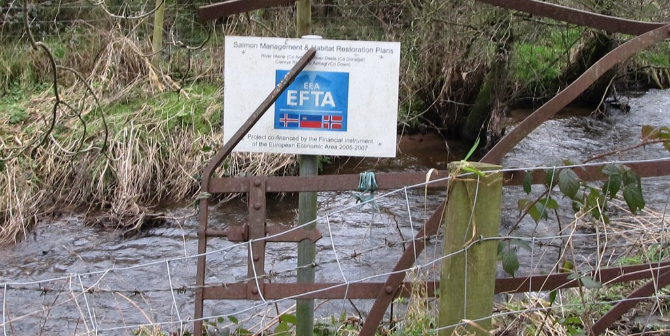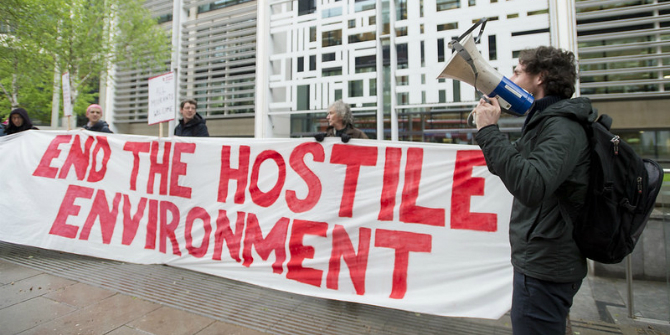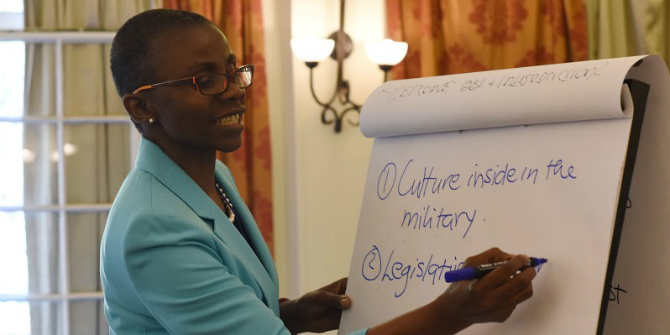
On behalf of Scotland, Nicola Sturgeon has urged that the UK leave the EU but remain within the Customs Union. It should seek also to join the European Economic Area on the same terms as Norway and Iceland enjoy. Many others have defended the same proposal. On a free vote, it would probably command a majority in the House of Commons. And why should not the EU accept it? David Wiggins (Oxford) discusses the EEA option and concludes it is the necessary compromise in the aftermath of the 2016 referendum.
Brexiters see the so-called EEA option as spurning or obstructing or negating the will of the people, rather than as offering a way of implementing that will. But here, on the levels of policy, of fact and of democracy itself, the Brexiters are simply mistaken. By origin and by definition the EEA is not the EU, and the case for our staying in the Customs Union derives from an inescapable commitment which does not derive from the EU.
First then the EEA. In his Concise Encyclopedia of the European Union (2004), the late lamented Rodney Leach, a singularly well-informed Eurosceptic, a friend and counsellor to numerous Brexiters, writes that –
“Membership of the EEA does not commit the signatories to the Common Foreign and Security Policy, to co-operation in Justice and Home Affairs, to EMU, to the Common Agriculture Policy or to the Common Fisheries Policy. Moreover, the institutions of the EEA, including the EFTA Court are expressly stated to lack the authority claimed by the institutions of the EU. Thus most of the areas which define national independence remain within the competence of the three remaining EEA states that have elected not to join the EU (Iceland, Liechtenstein and Norway). At the same time, these countries escape the most intrusive and costly of the EU’s policies — altogether perhaps a less bad bargain than the EU would care to admit for surrendering a say in the framing of Single Market legislation.”
The EEA then is not the EU, nor yet is it a creature of the EU. It is what remains of EFTA, the European Free Trade Association, a British-inspired rejoinder or counterstroke (1960) to the Treaty of Rome (1957). EFTA signalled our anxiety whether the remnants of Imperial Preference could suffice for a trading nation such as the UK. That anxiety has been at once justified and alleviated by the volume of trade we now have with Europe. It amounts to 49%. EFTA signalled also that countries staying outside the EU would be well advised to defend their own interests (not least perhaps those relating to fisheries).
Joining the EEA is not the same as staying in the EU. In our circumstances, it is the best way of leaving the EU. But what is the case for staying within the EU Customs Union? Above all, the impossibility of a north-south border in Ireland. Under the Good Friday Agreement (1998), the British government solemnly undertook, among many other things, to remove all security installations between the Six Counties and the Republic of Ireland. No referendum can instruct or authorise the British government to withdraw from this undertaking — even though continued membership of the Customs Union prevents us from making new trade agreements otherwise than collectively with other members. This is a damaging restriction, it will be said. Can we not withdraw from the Good Friday Agreement? We cannot. Just as Brexit is Brexit, so agreements are agreements. Treaties are treaties. Pacta sunt servanda. That should really be enough. But let it be added that what is at stake here is nothing less than peace in Ireland.
Brexiters have been apt to think that the Irish border question can be solved by some sort of automation of crossing points (all two hundred of them?) or other sophistications. But any such idea rests on a failure to understand what was so slowly and painfully achieved in 1998. It threatens Sinn Fein with the undoing of what Gerry Adams was able to assure his supporters was the completion of one whole phase in their struggle. Under the Good Friday Agreement of that year, citizens of Ulster can assume Irish or British nationality or both. If ever the Six Counties vote to join the Republic, they will be free to do so. Meanwhile, the citizens of either country can come and go as they please, without let or hindrance, by land, by sea, by country lane or footpath. Now, at last, Sinn Fein can see Ireland as one country. If ever that idea is taken away from them, it will be unwise to be sure that Gerry Adams or anyone else will be able to console them. If Brexiters grieve for the loss of the chance to pursue trade agreements of our own, let them remind themselves of the full horror of civil war and the thousands (among them British soldiers and civilians) who were killed, maimed or murdered during the Troubles.
Traffic in goods apart, there is also cross-border trade in services between the UK and the EU. There the Irish argument does not apply. But at this point, Brexiters might remember the old saying ‘a bird in the hand is worth two in the bush’. In this case, the bird in the hand is a large fraction of the taxation that HMG gets at present from the City of London in respect of trade in services. What else is to be made of the referendum result? It does not authorize the dissolution of the United Kingdom. (So far, the Westminster government has scarcely consulted at all with the other three.) It does not authorize the Home Office to pursue policies which reek of shameless ingratitude for the indispensable contribution that foreign nationals make to life in the UK. Nor yet can the referendum result authorize the pauperization, however unintended, of the people whom Theresa May would have now to describe as only just managing — or not even that.
 Copyright Eric Jones and licensed for reuse under this Creative Commons Licence
Copyright Eric Jones and licensed for reuse under this Creative Commons Licence
In so far as Nicola Sturgeon’s proposal respects constraints such as these and minimises damage to the economy, it has a strong claim to be the best mediation there can be between the interests of the 48% and the interests of the 52% who prevailed in the referendum.
But why should there be any mediation at all? Was not the referendum a perfect realization of direct democracy? Is not direct democracy the purest embodiment of democracy itself? Cannot direct democracy command our simple departure from EU and all its several dependencies — whether with or without further consultation with the EU?
For direct democracy people seem to think they should look first to 5th-4th century Athens. But Athenian democracy arose out of a quite distinctive conception of shared liberty and equality. If there was ever a prospect of anything remotely comparable to that sort of solidarity taking hold in Britain, it exists no more. Another difference is that, in the Athenian assembly, the vote was taken after argument, back and forth, face to face, in front of all citizens who chose to be present, whether to listen or to speak. Such exchange was sometimes impassioned, but not as such inhospitable to compromise or change of mind.
If we are to understand what is possible where we now are, it is more useful to explore our own times and hark back for a moment to Churchillian democracy (democracy as the ‘worst of all possible forms of government apart from those which have been tried from time to time’). There all adult citizens have one vote and enjoy equal access to the representative of their interests in Parliament. Under this system, many votes are ineffective or simply wasted. But proportional representation promises remedies of a sort. Others can be set in train. Impatient, however, with such tinkering — and eager to prevent politicians’ intruding ‘their own preferences’ into properly democratic governance (a mistake not peculiar to remainers) — some theorists have proposed referendum as the only democratic way forward.
What justifies this shift? When we search for the argument, perhaps we should think of the underlying theory as moving beyond the idea that citizens matter equally and have an equal right to their say upon matters of public policy — that does not take us very far beyond Churchillian democracy — to the further and different idea that all citizens have a right to say their say for themselves, and the further right for that say of theirs to count for no less than any other citizen’s say. Such is the argument for a referendum. One side wins, and then we do what they vote for.
If this is the way the argument goes, however, and the present situation is the result, then it is hard not to object that the force of the equality principles that start the transition just described is not yet exhausted. Suppose some winning policy is conspicuously lacking in equal regard for the equal interests and the equally vital needs of other citizens, the losers. Suppose the winning policy threatens us with what Tocqueville called the tyranny of the majority. By hypothesis, the losers are no less equal citizens than the winners. The same conception that underpins the case for referendum suggests that its outcome can be intolerable. That need not be presented as a contradiction. What it shows is the necessity for compromise — or else for a theory of referendum that excludes referendum where such a result may be its outcome. Such an exclusion follows from the conception of equality that the argument for referendum began with.
As things now are, who must mediate? Members of Parliament must mediate — in defiance where necessary of party machinery and all the other forces that bring ignominy upon parliamentary democracy. Once they look for compromise, EEA plus Customs Union is far preferable (I venture to say) over the expense, delay, bad behaviour and other complications that will attend the holding of another referendum.
By way of conclusion — by way of annex to Churchill — let me offer words from Aristotle, a practised observer of political events as well as of nature and a philosopher well placed by his position in time to survey impartially (he was not an Athenian) a whole century and a half of democratic endeavour:
“Many things that are held to be democratic destroy democracies, just as many things held to be oligarchical destroy oligarchies… It is possible for an oligarchy or a democracy to be satisfactory even if it diverges from the theoretic ideal. If one strains either of them further, first one will make the polity worse, and then, in the end, one will make it not a polity at all.”
This post represents the views of the author and neither those of the LSE Brexit blog nor of the LSE.
David Wiggins is Wykeham Professor of Logic Emeritus, University of Oxford.







A well presented article.
At the end of the day the Irish situation could be working well without a hard border.
There should be because of this give and take,very severe punishment on persons found to be flaunting the rules and not playing the game(so to speak) and these rules should be so clearly exhibited that no one is in any doubt as to the punishments if broken.
I could list the types of severe punishment but I no doubt would be castigated for being cruel. However if we are to have peace and tranquility rule breakers should know that it is not their “Human Right” to break this tranquility. Having been well informed that breaking of these rules will lead to their demise, they would have no one else to blame……The price of Peace.
The EEA plus Customs union does not respect the referendum result. The consensus is the referendum was decided by a desire to end free movement of workers with the EU27, end large annual payments to the EU, restore law-making powers to Westminster and facilitate new free trade agreements with those countries outside the EU that now make up the majority of our trade. None of those things are possible if the UK is in the EEA and customs union.
It would be best to trade with the EU on the same WTO terms we currently trade with the rest of the world. All the systems are in place today for our existing non-EU trade. After some years of the UK collecting £13 billion in tariffs on its imports of food and goods from the EU27 they may want a FTA. Perhaps. But that is for the distant future after the current generation of EU leaders are replaced by more pragmatic individuals.
The problem we have, John Freeborn, is that there is a great deal of misinformation about EEA/Efta in the public domain.
The referendum result was to leave the EU. Norway and other Efta states are clearly not in the EU.
There was no consensus on the reasons for leaving – look at the large sample poll taken at the referendum.
THE EEA agreement has (competence only for Efta states) a safeguard clause (article 112) which is unilaterally exercisable. This can be used to deal with large immigration flows.But there are many things which the UK government can do to tighten up the rules.
This is no reason to have a customs union with the EU, this has been blown up by the press and is a red herring. None of the EEA/Efta states have one and the UK can therefore enter into FTAs with other countries, either through Efta itself (all Efta FTAs have accession clauses) or directly as Iceland/China. All that is required is a customs arrangement and some beefed up annexes and protocols to a new EEA agreement, which is, in itself,a highly flexible document. .
The UK doesn’t and no major economy trades solely on WTO rules. Have a look at the EU treaty database.As soon as a trade enabling agreement is signed, it becomes a bilateral relationship rather than a WTO rules based one.
Above all, any sane person by now should realise that the UK is entangled in the EU and untying the complex relationship will take a long time and thus leaving the EU is a process rather than an event. Accordingly, EEA/Efta allows this process to proceed without time being a factor, as it is now to our detriment.
.